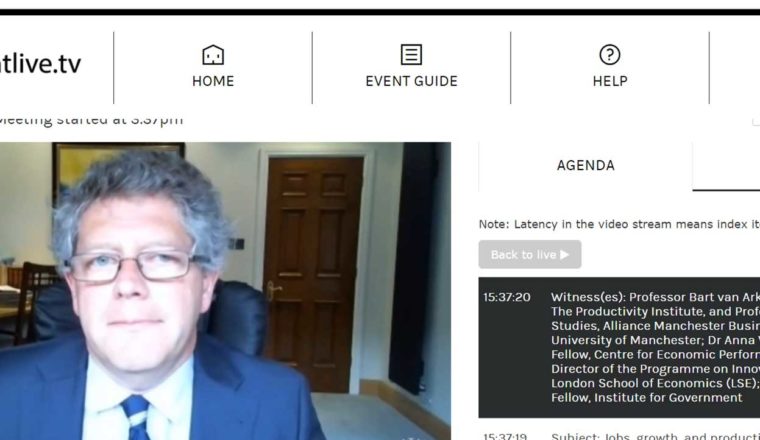TPI expertise at the Treasury Select Committee
The House of Commons Treasury Select Committee has released its fourth report of session 2022-23, Jobs, growth and productivity after coronavirus, which includes a number of TPI colleagues who gave oral evidence to the committee.
The inquiry aims to discover, among other things, how much difference government policy can make to economic growth, the causes of the UK’s persistently weak productivity growth, and how successful the Government’s pandemic response has been in protecting jobs. At the macroeconomic level, the report also looks at to what extent a return of inflation is a risk to the economic recovery and whether monetary and fiscal policy can improve employment, growth and productivity outcomes.
Colleagues from The Productivity Institute feature prominently in the report, providing their expertise on the subject. TPI Managing Director Bart van Ark is quoted throughout the document, lending his expertise on improving skills in the workforce, bolstering education, increasing equality in housing and the implications of the growth in remote working, all of which have significant implications for productivity. In particular, he discussed the fact that the slowdown in productivity growth is more reflective of a failure to adopt technologies throughout the economy, rather than a slowdown in the rate of innovation itself:
“A lot of the technology challenges that we are seeing are not around the fact that the technology is not available and not even that it does not get diffused but that it does not get absorbed by many companies. To make this happen, we need to facilitate the companies that can do this and, indeed, the companies that will ultimately not do it should be allowed to fail. These new technologies—in particular the latest vintage of digital technology: mobile, data analytics, the move to robotics and artificial intelligence—are quite complicated technologies for companies to integrate into their business models. It tends to be larger companies, companies that have been able to invest significantly.”
Rain Newton-Smith, who is Chief Economist at the Confederation of British Industry and a member of our Advisory Committee, told the committee that that businesses accept the increase in corporation tax, but would need new investment incentives from 2023 as a priority.
Professor Jagjit Chadha, Director at the National Institute of Economic and Social Research and the lead on our Macroeconomic trends and policy research theme, offered his view that UK policy needs to move away from short-termism:
“What might be missing in the middle of all this is a Ministry of the Economy, something that thinks about where the economy needs to go to, rather than necessarily trying to balance the books in that way. The Treasury, by its nature and its very name, is very much about trying to limit expenditure and ensure the books are balanced. […] The country needs a little bit more than that at the moment. It needs some way of bringing forward investment on a medium to long-term basis to deal with the gaps that we are seeing year after year in the economy.”
Meanwhile, Dr Anna Valero, Deputy Director of the Programme on Innovation and Diffusion (POID) at London School of Economics, spoke to the panel about the need for collaboration and digital adoption, as well as the productivity-boosting potential of better trained managers through the Help to Grow scheme. Anna provided one of the keynote speech at our 2022 Research Conference, while POID works complementarily with TPI as one of the research arms into productivity funded by UK Research and Innovation.
Further oral evidence was provided by key stakeholders of The Productivity Institute:
- Kitty Ussher, Chief Economist at the Institute of Directors – she also gave evidence to our UK Productivity Commission, which is run by our partner the National Institute of Economic and Social Research.
- Lord O’Neill of Gatley, Vice Chair of the Northern Powerhouse Partnership – to listen to his thoughts about productivity and the Northern Powerhouse, listen to our podcast episode on the subject.
- Irene Graham OBE, CEO of the ScaleUp Institute – Irene is a member of our Steering and Impact Committee.
Read the full Treasury Select Committee on the UK Parliament website; alternatively, you can also read the report summary.



